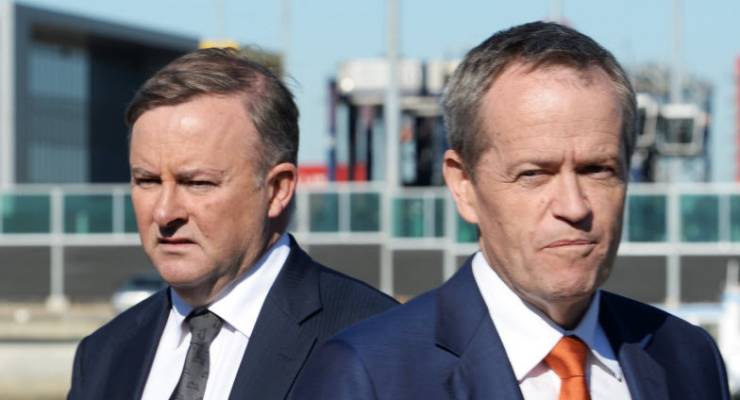
Going by the headlines, Labor’s election review blamed the party’s election loss on a weak strategy, cluttered policy agenda, and an unpopular leader.
But the 91-page report has given every pundit and politician enough room to argue a point.
Bill Shorten
Ahead of the official release, Shorten got in early with his statement.
Were the universe to grant re-runs, I would campaign with fewer messages, more greatly emphasise the jobs opportunities in renewable energies, and take a different position on franking credits.
Scott Morrison
Announcing yesterday’s drought package, the prime minister kept it brief:
The Australian people know the answer to that question, and they’re still not listening to them, the Labor Party. I mean, it’s six months after the election and Labor is still talking about themselves.”
Labor faithful
Internally, Shorten’s wing is upset over the emphasis on the former leader’s unpopularity. Penny Wong praised the report’s honesty, while Chris Bowen called on the party to listen to workers and acknowledged the need to review franking policies in the wake of successful Coalition attacks.
The Australian
Today’s Oz offers multiple takes, from a news report that labels the party as “weak, risky and unpopular”, to Paul Kelly’s dissection of Shorten’s statement — “full of import” demonstrating “his ambition is undiminished” — to Simon Benson’s triumphant takedown of a campaign machine that “believed in its own genius that there was no prospect of losing”.
The Daily Telegraph
Columnist Tim Blair ran through the report almost point by point, displaying typical restraint: “When you win the Greta Thunberg vote, you lose the normals.”
The commentariat
Over at the less gleeful end of the commentariat, Guardian Australia’s Katharine Murphy dissected Labor’s core challenge of walking both sides of the street.
The ABC was typically straight down the line: political editor Andrew Probyn honed in on Albo’s “salesmanship” challenge on climate action, while national affairs reporter Greg Jennett explored how Labor, according to the report, went “too hard too early”, resulting in both a big and inflexible target.








At last someone notices labors use of ranking credits to raise money. Any thinking person will see that the franking credits are only payed out to people with no taxable income – mostly labor supporters not all of whom are behaving outrageously. You don’t have to be too much brighter to see that allowing franking credits to reduce taxable income and therefor tax is giving away money just the same.
If we really wanted to be radical it would be better to scrap income tax and levy a decent GST and block loopholes. Well off citizens can only avoid this if they don’t spend their money. While we are at it credit card companies shroud collect GST on overseas purchases.
Peter Kemp
PO box 94, Adelong, 2729
0438 732 318
“.. allowing franking credits to reduce taxable income and therefor tax is giving away money just the same.“
As this quote shows the main problem with franking credits in general is that it’s a bit complicated. It took me quite a bit to fully understand how it works and I’m good with numbers.
First and foremost franking credits in themselves do not reduce taxable income. Your tax return includes the full amount of dividend paid and franking credits. $1000 of fully franked dividends is paid as $700 dividend and $300 franking credit. However the full $1000 is still declared as taxable. The $300 is credited against any tax payable.
Where it helps many retirees is that after 60 yo super withdrawals aren’t taxable. Also since Howard changes the original system any unused excess credits are paid out to that taxpayer. This is the bit ALP wanted to abolish but few people actually understood it.
It was therefore ripe for a major scare campaign which the LNP duly provided. Various studies also showed the greatest beneficiaries were the well off. However the greater number of beneficiaries were less well off and more dependent on this small income boost.
Next ALP inquiry should be the more precise details of Clive’s multi million spend which harvested preferences to LNP where they mattered most. It wasn’t a resounding LNP win. Look at the before and after seat numbers.
Yeah, had a similar reaction as the final screenshot. They ignored a popular policy, alienating a part of the population that is starting to organize. It is specifically why I didn’t hold my nose and vote. They can’t even be bothered thinking about it at all.
Seems a lot of soul searching when Labor and the Libs both lost a seat and the LNP picked up two, because, you know, it’s Queensland.
“The 91-page report has given every pundit and politician enough room to argue a point”
Which is just the problem – would you not say Chris? In other words the 91 page report means anything one pleases to anyone. I recall the deal of flack that I received when I suggested at various intervals, on these pages, from September to November 2017 that it was anything but “in the bag” for Labor.
Interesting to see the reactions of those surprised by the result. Frankly, I took a greater interest in the USA mid-terms which (surprise – seldom ever not the case) amounted to a reaction against the party of the President in the House but the Senate vote improved. Over eight years Obama blew both the House and the Senate. Oz has very much swung to the Right. Frankly, I doubt if Medicare could be implemented nowadays.
It is largely about the population being at “P” with regard to the alphabet when Somerset Maugham was invited to speculate on the (average) intelligence of the man in the street. The electorate may be street-wise but they can’t cope with multiple layers of information over a sustained period of time (which is a function of intelligence). To this extent simple minded Morrison et al. had a distinct advantage.
As to “jobs” per se the mine itself is only short-term at best. Ditto for timber/forestry. Forestry is sustainable only with systematic replanting (ONE thing that NZ has got right – giving credit where it is due) but the industry is also becoming more technologically advanced and hence (very) much less labour intensive.
More can be done with less people and such is a reality in every industry. In other words the mine is not a panacea and NOT a long term option for employment. To claim that Shorten was unpopular is to scrape the base of the barrel.
The composition of the working class and its aspirations have also changed. Blair understood this reality and Corbyn is doing all he can not to make a mess of it. The employee of “today” has no comparison to the employee of 50 or 60 years ago. In fact s/he has much more in common with a Liberal voter of half a century ago from investments to holiday houses and negative gearing.
MUCH more to the point was that either the major media services failed to see the trend OR (and much more likely) failed to report the trends against Labor. Moreover, the questions put to voters are highly correlated, nowadays, and it is VERY difficult to analyse correlated data and impossible to obtain accurate two-party preferred forecasts. It has got to the stage where the forecasters do not have the data-science analytics of the global banks to undertake the required analysis. ho hum.